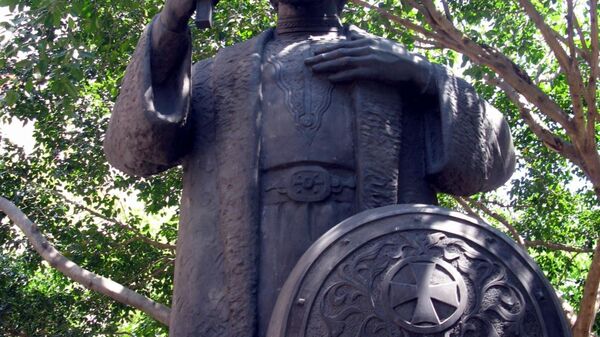Baptism Day of Russia: How Prince Vladimir abandoned paganism – RIA Novosti, 01.03.2020
On July 28, Russia celebrates the holiday – the day of the baptism of Russia. In the Orthodox church calendar, this date (according to the old style is July 15)-the day of the memory of the Equal-to-the-Apostles Prince Vladimir (960-1015).
Baptism Day: As Prince Vladimir abandoned paganism

On July 28, Russia celebrates the holiday – the day of the baptism of Russia. In the Orthodox church calendar, this date (according to the old style is July 15)-the day of the memory of the Equal-to-the-Apostles Prince Vladimir (960-1015).
On July 28, Russia celebrates the holiday – the day of the baptism of Russia. In the Orthodox church calendar, this date (according to the old style is July 15)-the day of the memory of the Equal-to-the-Apostles Prince Vladimir (960-1015). On June 1, 2010, Russian President Dmitry Medvedev signed the Federal Law On Amending Article 11 of the Federal Law On Days of Military Glory and Memorial Dates of Russia .
With a proposal to give state status to the Day of Baptism of Russia was the Russian Orthodox Church.
In June 2008, the Bishop Cathedral of the Russian Orthodox Church decided on the day of the Holy Equal -to -the -Apostles Prince Vladimir on July 28 to be a worship under the charter of the Great Holiday, and also turned to the leadership of Russia, Ukraine and Belarus with a proposal to include the day of the Holy Prince Vladimir to the number of state memorable dates.
In Ukraine, a similar date is a public holiday called the day of the baptism of Kievan Rus – Ukraine, which is celebrated annually on July 28 – on the day of memory of the Holy Equal -to -the -Apostles Prince Vladimir. The holiday was established in July 2008 by decree of the President of Ukraine.
The first official celebration of the baptism of Russia occurred in 1888 at the initiative of the chief prosecutor of the Holy Synod Pobedonostsev. The anniversary events took place in Kyiv: on the eve of the anniversary, the Vladimir Cathedral was laid; The monument to Bogdan Khmelnitsky was opened, solemn services were performed.
The celebration of the 1000th anniversary of the baptism of Russia in the USSR was intra-church in nature; The main general church celebrations were held on June 12, 1988 in recreated specially for the anniversary of the Moscow Danilov Monastery.
The baptism of Russia occurred in 988 and is associated with the name of Prince Vladimir, whom historians called the Great, the Church – the Holy Equal -to -Apostles, and the people called Vladimir the Red Sun.
Prince Vladimir was the grandson of the Grand Duchess Olga and the son of Prince Svyatoslav and the things of the Virgin of Malushi, who became a Christian with Princess Olga in Constantinople. He began to rule on his own from the age of 17 and spent the first six years on campaigns. According to legend, in these years the prince was a pagan, a lover of military campaigns and noisy feasts.
A strongly strongly, Russia turned out to be surrounded by less strong, but more enlightened states. More and more often in Russia, the word of preaching of true faith was heard, the first Russian martyrs for Christ who denounced the service of idols appeared.
Tradition says that in 983, after a successful military campaign, Vladimir decided to make a human sacrifice to the pagan gods. It was decided to choose her with the help of lots, which fell on the young man John. The young man's father Theodore, being a Christian, did not want to give up his son and began to condemn pagan idols and glorify the Christian faith. Then an angry mob of pagans killed Theodore and his son. These were the first Christian martyrs in Russia, the memory of the holy martyrs Theodore and his son John is celebrated on July 25 (12 according to the old style).
As the chronicles tell about the choice of faiths (testing of faiths), embassies from different peoples came to the prince in Kyiv in 986, urging him to convert to their faith. First, the Volga Bulgarians of the Muslim faith came and praised Mahomet, then foreigners from Rome from the pope preached the Latin faith, and the Khazar Jews preached Judaism. The last, according to the chronicles, was a preacher sent from Byzantium. He began to tell Vladimir about Orthodoxy. To understand whose faith is better, Prince Vladimir sent nine envoys. The ambassadors visited the countries where the preachers came from. Returning to Kyiv, they told the prince everything they had seen and praised the Greek Orthodox faith. However, Vladimir did not immediately accept Christianity.
In 988, he captured Korsun (now the territory of the city of Sevastopol in Ukraine) and demanded Anna, the sister of the Byzantine emperors Basil II and Constantine VIII, as his wife, threatening otherwise to go to Constantinople. The emperors agreed, demanding in turn that the prince be baptized so that the sister would marry a fellow believer. Having received the consent of Vladimir, the brothers sent Anna to Korsun. In the same place, in Korsun, Vladimir and his warriors were baptized by the Bishop of Korsun, after which he performed the marriage ceremony. In baptism, Vladimir took the name Basil, in honor of the ruling Byzantine Emperor Basil II.
© RIA Novosti / Mikhail Kuleshov / Go to photo bank Wall painting in the Faceted Chamber of the Grand Kremlin Palace. Vladimir the First with his sons
